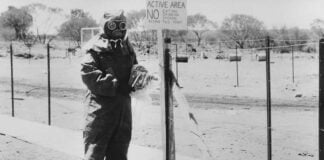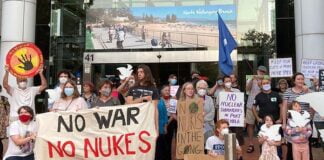At the end of July Private Benjamin Ranaudo became the eleventh Australian soldier to die in Afghanistan. Both Prime Minister Rudd and Opposition leader Turnbull described his death as a tragedy.
It is a tragedy that any young man should die in order to save American credibility in Afghanistan. It is a double tragedy that there is so little public debate in Australia about Australia’s involvement in the war in Afghanistan.
After nearly eight years of occupation, public opposition to the Afghanistan war in the US, the UK and Europe is mounting. Here in March this year 51 per cent of people polled said they oppose Australian involvement in the Afghanistan occupation and two thirds said they oppose any increase in the number of Australian troops deployed there.
The Rudd government increased Australian troops by 500 to 1550 anyway. Five soldiers were killed in the last 12 months, nearly double the total of the previous seven years. It is clear that as more Australian soldiers die, the opposition to the Afghan war will grow so it becomes a problem for the Labor government.
Their response has been to seize every opportunity to increase the rhetoric about terrorism and the imperative of the “war on terror”. Nonetheless questioning of the Afghanistan deployment has started amongst some of the political commentators.
The failure of the Karzai government, or foreign aid, to deliver any improvement in health, education or basic needs like water and reconstruction to the Afghans has destroyed all goodwill towards the president and the occupation. The international aid money is inadequate and has disappeared into the pockets of corrupt officials, government and NGOs, and opium cultivation remains the primary income for most poor farmers.
In the Pushtun southwest of the country, the focus of NATO military action, there have been thousands of civilian deaths from the battles between the Taliban or local resistance and the NATO forces—and from the indiscriminate US airstrikes. The US attempts to end cross-border support from Pakistan for the Taliban, through military raids and attacks by unmanned drones killing hundreds, has infuriated the Pushtun tribes on both sides of the border. American pressure on the Pakistani army to attack Taliban or Islamist centres in the Northwest Frontier regions of Pakistan is greatly resented and threatens the stability of the Pakistani government.
Increasingly the Afghans see the Taliban as the one, uncompromising opposition to their foreign oppressors. There are real fears about the imminent presidential election after the Taliban issued threats to the voters. A Taliban suicide bombing outside NATO’s headquarters in Kabul which killed seven people and wounded 91 underscores the inadequacy of NATO’s security efforts.
When the United States invaded Afghanistan after the September 11 attacks, supported by her NATO allies and Australia, it was not just about revenge. It was an opportunity to extend US influence established in central Asia after the collapse of the Soviet empire. Control of Afghanistan brought with it the prospect of pipelines to exploit the Caspian basin oil fields.
Unwinnable war
After eight years retired generals in the UK and the US have publicly expressed pessimism about any prospect of success in Afghanistan or any conclusion to the war for decades. Here academic military expert Professor Hugh White has argued that the war cannot be won—because the NATO alliance will not put enough troops in and because the military task, to hold the population under military occupation indefinitely, is impossible anyway.
The real reason for Australia’s joining the occupation of Afghanistan is, as the ABC’s Chris Uhlmann terms it, alliance maintenance. The Australian ruling class remains committed to the US alliance as their ultimate guarantee of security, but also to secure access to US investment and markets.
So the Labor government under Rudd could oppose the war in Iraq but remains staunch about Afghanistan. However the rising number of deaths and casualties is eroding public support. At present Afghanistan is hardly an issue, unlike unemployment and the economy or climate change, so there is no political pressure on the government or the opposition to justify occupying Afghanistan to “fight terrorism”.
The task for the left is to find means to give public expression to the opposition to the Afghan war and generate political pressure on Rudd to get out of it. The rally in Sydney to mark the eighth anniversary of the invasion on October 7 is an opportunity to generate public questioning of the Australian commitment that must be seized.
By Anne Picot





